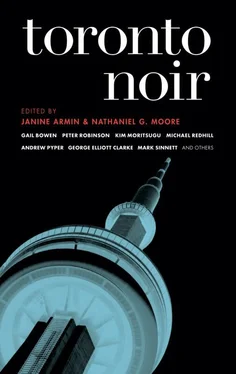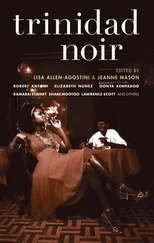Meera grew pale with the unfolding of the tale. Like a journey taken on a cloudy morning, its horrifying destination was rapidly becoming clearer as more steps were taken. Persaud’s face was pleading, almost desperate with apology. “No,” he said. “I not want fo’ do dat! I tell dem. Dis pandit does not hold wit’ dem old ways!”
But he had to tell them something. If he just sent them away, who knew what atrocity they would enact? Perhaps they would kidnap some poor fool and murder him sloppily in their own homemade Kali puja , accomplishing nothing except creating misery for all involved — and offending God in every way possible.
“So I tell dem,” Persaud said. “I tell dem: It must be a white child. Dem must kill one white child.” He sat back against the wall, grinding his gums, waiting for Meera to react. But there was only silence.
Meera regarded him with a strange detachment, struggling to balance horror with pity and disgust. She felt herself slide backwards, her hands near her face.
Persaud leaned forward again. “Undahstand! You got fo’ undahstand! Where dem stupid boys go find one white child? We never see no white pickney. Only white man wit’ he gun, he whip, and he stick. Where dem skinny brown village boys go get one white child? I been tryin’ fo’ save dem, see? I been tryin’ fo’ prevent dem doin’ some damn stupidness!”
Persaud’s eyes exploded into tears. They rushed like torrents down his cheeks and into the sides of his huffing mouth. His breathing was shallow and forced, wheezing at times between bouts of fitful, pathetic wailing.
“I been tryin’ fo’ mek dem task impossible,” he whispered into the tissues Meera was using to wipe his face.
“But it wasn’t impossible,” Meera asked cautiously. “Was it?”
At that, Persaud reached into the front pocket of his pajama pants and pulled out a crumpled, yellowed piece of newsprint. Meera took it and unfolded it. On the top it read, Stabroek News, Georgetown, Guyana . The date was 1961. It was a story about the disappearance of the baby daughter of the overseer of a sugar cane plantation in rural Guyana. Her name was Helen and her surname was seemingly Dutch. There was no photo, but Meera assumed the girl was white.
“My God,” she said aloud. “They found one.” Persaud nodded and sobbed. “But how can you be sure they killed her? Or that they were the ones who killed her?”
Persaud laid back against the headboard of the bed, spent. His face glistened with tears and sweat and his head now resembled a desiccated brown skull. He seemed to be aging before Meera’s very eyes. Unexpectedly, he smiled in that dejected but resigned way that the elderly sometimes do. “I know,” he said, “because dem bring me she body. Dem wanted fo’ know if it been done right, according to the old ways.” He breathed sporadically now. “And I told dem yes. Yes, it been done good, according to dem damn old ways. Yes.”
Meera stared at the pathetic old man, suddenly aware that she was watching death creep over him, consume him cell by cell. It was an oddly emotionless observation, one that shamed her and pushed her back into her professional demeanor. Only then did she notice that Yanni was standing behind her, his hand on her shoulder. “You heard?” she asked him.
“Yes,” Yanni said. “It’s a city of immigrants, you know. Everyone’s got secrets and stories from some faraway place. We’re supposed to start fresh when we get here, no? Let’s take him back now, okay?”
But Persaud was not done yet. “Boy,” he said weakly to Yanni, “Yahhhm comin’ now. Go and see.”
Yanni slitted his eyes in annoyance, but returned to the window nonetheless. He rushed back to report to Meera: “It’s true. The fellow who was watching me is gone. I think he might have come into the hospital!”
Persaud’s face contorted then. With surprising strength, he locked his hand onto Meera’s arm, hurting her slightly. “Yahhhm comin’!” he gasped. Meera could sense the otherworldly terror that possessed Persaud, but could do nothing for him. She tore his grip away and began sifting through the room’s supplies, searching for a sedative.
From the empty hallway came the unmistakable sound of approaching footsteps. These were not the steps of the nurses, who wore sneakers or delicate high heels, but of a large man in boots. Meera’s eyes met Yanni’s and the young man leapt to his feet and to the door, just in time to intercept a blond youth in a blue-and-white University of Toronto jacket. “You!” Yanni barked at him. “Visiting hours are over. You’re not supposed to be here.”
“Sorry,” said the young man, looking about the room sheepishly. “I’m with the student paper. I saw the light coming from the window and thought it would be a good place to get an aerial photo of the accident.” He pulled a camera from his jacket pocket and showed them.
“You’ll have to leave. Sorry.” Yanni pushed him back into the hallway and toward the exit. “See?” Yanni called back to Persaud. “Not the bloody god of death!”
But, of course, Persaud had already expired. His lifeless body lay sprawled atop the bed, like a grotesque skeletal clown bedecked in striped pajamas and pink slippers. His final expression was not that of an old man placidly accepting his final rest, nor that of a holy man content to meet his god. Rather, it was a pose of profound terror and worry, with crevices of skin radiating around his open mouth and his gaping yellowish eyes. Thankfully, Meera was not reminded of her father. He had had the good grace to slip from mortality with silent dignity, his worldly tasks completed, and with no important words left unsaid. But, she judged, not so for Manoj Persaud.
“I thought telling his story was supposed to bring him peace,” Yanni said.
“I don’t think he told us the whole story,” Meera explained. “He said they brought the girl’s body to him. But he didn’t tell us that she was still alive at the time.”
Yanni slipped his hand into hers. Meera stretched up and kissed him on the cheek.
“Hey,” she whispered. “Midnight shift is over.”
Can’t buy me love
by Christine Murray
Union Station
Union station. 6 o’clock. Commuter-throng in the basement concourse. Head-numbing fluorescent lights, the terminal as garish as a 1950s office space. I breathe in the odorific confluence of fast food and rubber-soled shoes and scan the room for a free bucket seat, preferably one with a view of the overhead screen. Train’s not up there yet, so I’ve plenty of time.
I locate a seat between two average-looking drones. The lady to my right ruffles her newspaper back and forth like a perturbed swan beating its wings. She gives me a peripheral going-over and crosses her legs purposefully, cinching her ankles together. To my left, a mid-forties businessman reads from a men’s magazine with a semi-naked brunette on the cover. I recognize her — young actress, former child star. She’s on her knees, legs apart, back arched, blouse open above the navel.
There’s something attractive about Union’s retro décor. Its generic quality makes it easy to ignore. You can see the people for the trees, so to speak. Not like new terminals, where you can’t see the people for the gleam off all that stainless steel. Different story here, from the dude engrossed in “Real-Life Sex Injuries 101”; to the lady now methodically folding her newspaper into accordion-style strips; to the platinum blonde with long silver nails standing at the bay of pay phones dead ahead. She’s wearing a neon-green mini-dress, rollerblades over her shoulder. Cradled by her neck, the phone seems too large for her childlike head, the black receiver as oversized as a clown’s shoe — a clown’s phone.
Читать дальше












